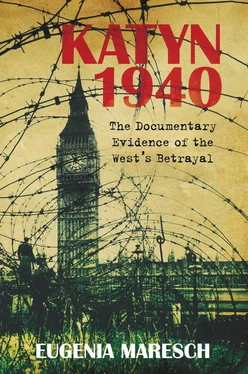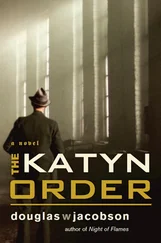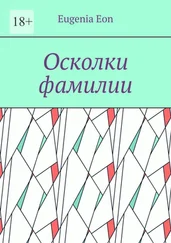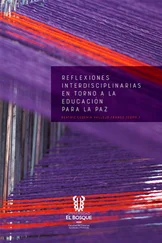Ferdynand Goetel’s Recollections
Ferdinand Goetel, a well-known writer and chairman of the Polish PEN Club, found himself in difficult and controversial circumstances when he decided to go to Katyn with the first group of five Poles, on 10 April 1943, to inspect the burial site. He reported the findings directly to the PCK (Polish Red Cross) in Warsaw and to the Polish Underground authorities. It also appeared in Biuletyn Informacyjny as an open letter, in consequence of which the Polish communist press castigated him as a Nazi collaborator. He had to lie low and towards the end of 1945, living under the communists, he decided to escape from Poland to join the Polish Army, still stationed in Italy. He repeated his earlier testimony on oath to the Military Court attached to the forces in 1943. [10] Polish Institute and Sikorski Museum (PISM) KOL 12/16d L.dz. 2575/t.jn.43. Typescript reports on the first visit of the Polish delegation to Katyn, among them Ferdynand Goetel, sent from Warsaw and translated by Oddział VI Special Operations Bureau, headed by Lt Col Michał Protasewicz for the Polish Ministry of Defence and Ministry of Internal Affairs, dated 27 May 1943. The report also covers the news of Skarżyński’s report of 16 April 1943 to the International Committee of the Red Cross in Geneva.
Goetel was engaged by the Biuro Informacji i Propagandy (Department of Information and Propaganda), primarily to gather further statements from Polish soldiers who had been in Soviet camps or from eyewitnesses like Krivozertsev, whose recollections follow Goetel’s, below. [11] PISM KOL 12/3 5 page typescript report in Polish by Ferdynand Goetel dated London 19 December 1946. Translation by EM.
In the first days of April 1943, I was telephoned by Władysław Zyglarski, the Secretary of the Association of Writers and Journalists, and during the German occupation, one of the members of the so-called Literary Committee of the RGO [ Rada Główna Opiekuńcza – Council for Social Welfare], that I am keenly sought after by Dr [Karl] Grundmann from the Propaganda Abteilung [Propaganda Unit]…
Realising that something new had happened, I went to see Grundmann that afternoon. He informed me that not far from Smolensk in a place called Kozie Góry [Koze Gory], German military intelligence had discovered large communal graves, where Polish officers are buried. They started to open the graves, which gave unusual results. There must be several thousands of victims. The German authorities were greatly moved by this site and intended to support the Polish delegation by giving them assistance and not demanding from them any declarations, which might be used for German propaganda.
I was taken aback with the news, which immediately suggested to me that Koze Gory might hold the mystery of Polish prisoners of war in Kozelsk, Starobelsk and Ostashkov camps. I thought a while and asked Grundmann why he didn’t turn to the PCK with this problem, which is a fitting institution, with its rules and its significant standing among the Polish community. Grundmann agreed, but pointed to certain considerations, which made co-operation between that institution and Germany very difficult and pointed out they were probably well known to me.
Actually, I knew of the attitude of the Germans towards the PCK , which was the only remaining organisation in the General Gouvernment [ Generalgouvernment ], which represented the remnants of sovereignty of the Polish State. Guarded by international law, it resisted many attempts by the Germans to liquidate it. As a result, it scarcely formally existed and was reduced to caring for the 1939 casualties.
Realising that the PCK might be strengthened by the news from Koze Gory – if it was true – I agreed on condition that if I decided to go to Katyn, I would make a report to the PCK . Before then I wanted to know who was taking part in the delegation. Grundmann declared that representatives of the Warsaw Council of RGO , city councillors and representatives of the judiciary and clergy were invited. I was going to see them all tomorrow morning at an informative conference in Propagandaamt and departure would be in three days time by plane. I then declared that in these circumstances I agreed to take part, provided it was understood that my judgement about what I was about to see would not be bound by anything, I was acting as a Polish spokesman, I did not intend to keep secret what I was about to see in Koze Gory, and I would share my observations with the Polish community through every means possible. Grundmann accepted my conditions.
On leaving Grundmann, I hastily sought contacts for consultations with the Underground [ AK ] organisations he mentioned. I was a member of the Obóz Polski Walczącej (OPW) [Political group of Fighting Poland] and the editor of Nurt. I did not have direct contact with my superior Julian Piasecki. His contact ‘Koral’ was to see me in few days time so I took the option of contacting Marian Buczkowski who lived near me and through his contact with ‘Marta’ I managed to pass ae message about my talks with Grundmann to ‘Hubert’ [Koral, Marta and Hubert codenames], the head of propaganda for the Warsaw District BIP [ Biuro Informacji i Propagandy of AK, Armia Krajowa – Bureau of Information and Propaganda, Home Army]. According to Buczkowski, ‘Hubert’ ignored my account, suggesting that ‘the Germans were bluffing Goetel,’ nonetheless, he gave permission for me to go, and requested a report after my return.
I telephoned [Julian] Kulski, President of Warsaw and Machnicki, Chairman of the RGO and they did not deny that a trip was also offered to them, however they had showed some lack of interest, perhaps due to their apprehension. Theirs and ‘Hubert’s’ standpoint had annoyed me somewhat. The automatic dislike for any kind of initiative shown by the Germans did not seem warranted in this case. I knew that Katyn would be painful and fearful for all who touched it. Whatever we were about to see, the German or Bolshevik attacks were awaiting us. We had a foretaste of the latter in Warsaw.
At the next day’s sitting at ‘Propagandaamt’ , I met the town deputies in person: Dr Kip [Emil Kipa] and Director [Władysław] Zawistowski, Kulski excused himself due to being busy. Warsaw’s RGO was represented by Director Machnicki and [Stanisław] Wachowiak, the clergy by Reverend [Zygmunt] Kozubski, and the judiciary by someone unknown to me. Besides them there were a few others, whose names I do not remember. There was also Emil Skiwski the writer, whom Dr Gundmann did not mention to me.
Grundmann repeated the same story about Koze Gory with more details, and then read a list of names asking each if they were agreeable to go. The Rev. Kozubski excused himself, having a dislike of travelling by plane and his superior [Bishop Antoni W.] Szlagowski was unwell. Similarly Wachowiak and Machnicki, who proposed substitutes for the RGO and the City as Dr Kip could not come either. As regards representation of the judiciary, its chairman was seriously ill and someone else would be sent directly to the airport. As far as I remember, Rev. Kozubski for the clergy gave a similar declaration. (Neither of the delegates turned up at the airport).
The following day [10 April] at the airport, I met two doctors, one from the Warsaw City Council the other from RGO , additionally, Emil Skiwski and a few photographers. There was no official press present but a man introduced himself as the editor of a newspaper from Lublin. There was Edward Seyfried, Director of the Executive Committee of the RGO , as well as [Frederich, Wilhelm] Ohlenbusch, chief of German Propaganda Amt in General Gouvernment, he was assisted by a German and a cameraman in uniform, all of them arrived by plane from Kraków. Additionally, another Pole turned up from Radio Kraków, who introduced himself as Wąsowicz [Władysław Kawecki].
Читать дальше












